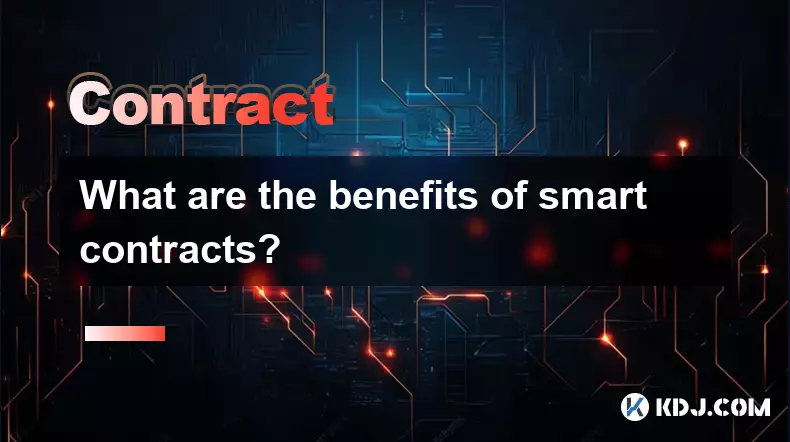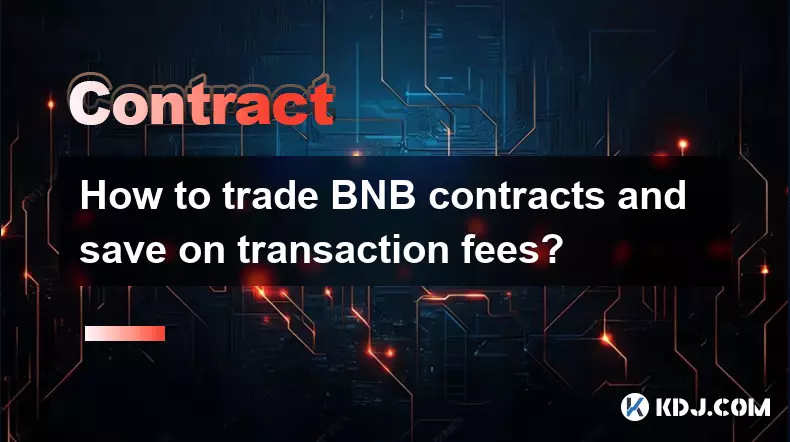-
 bitcoin
bitcoin $87959.907984 USD
1.34% -
 ethereum
ethereum $2920.497338 USD
3.04% -
 tether
tether $0.999775 USD
0.00% -
 xrp
xrp $2.237324 USD
8.12% -
 bnb
bnb $860.243768 USD
0.90% -
 solana
solana $138.089498 USD
5.43% -
 usd-coin
usd-coin $0.999807 USD
0.01% -
 tron
tron $0.272801 USD
-1.53% -
 dogecoin
dogecoin $0.150904 USD
2.96% -
 cardano
cardano $0.421635 USD
1.97% -
 hyperliquid
hyperliquid $32.152445 USD
2.23% -
 bitcoin-cash
bitcoin-cash $533.301069 USD
-1.94% -
 chainlink
chainlink $12.953417 USD
2.68% -
 unus-sed-leo
unus-sed-leo $9.535951 USD
0.73% -
 zcash
zcash $521.483386 USD
-2.87%
What are the benefits of smart contracts?
Smart contracts automate transactions, cut costs, and boost transparency by removing intermediaries and enabling trustless, tamper-proof agreements on blockchains.
Sep 19, 2025 at 04:55 pm

Automation and Efficiency in Transactions
1. Smart contracts eliminate the need for intermediaries by automating the execution of agreements once predefined conditions are met. This automation reduces delays commonly associated with manual processing in traditional contract enforcement.
2. The self-executing nature of smart contracts ensures that transactions occur precisely as programmed, minimizing human error and the risk of misinterpretation. This precision is especially valuable in high-frequency trading and decentralized finance (DeFi) platforms.
3. By streamlining processes such as token swaps, lending, and yield farming, smart contracts enable near-instantaneous settlement across blockchain networks, significantly improving transaction throughput.
4. Developers can deploy complex financial instruments directly on blockchains, allowing users to interact with protocols without relying on centralized institutions to verify or execute terms.
5. The removal of middlemen not only accelerates operations but also reduces operational costs across exchanges, custody services, and clearinghouses.
Transparency and Immutability
1. Every smart contract is deployed on a public blockchain, making its code and transaction history accessible to anyone. This transparency fosters trust among participants who can independently verify logic and outcomes.
2. Once a smart contract is live, its code cannot be altered, ensuring that the rules governing the agreement remain consistent over time. This immutability prevents unilateral changes by any party.
3. Auditors and security researchers can inspect contract code before deployment, identifying vulnerabilities and ensuring compliance with best practices in the crypto ecosystem.
4. Users interacting with decentralized applications (dApps) can be confident that the backend logic will function as advertised, reducing the risk of fraud or manipulation.
5. Public verifiability combined with cryptographic security makes smart contracts a cornerstone of trustless systems in the blockchain space.
Cost Reduction and Accessibility
1. Traditional financial agreements often involve legal fees, notary services, and administrative overhead. Smart contracts bypass these expenses by encoding terms directly into code.
2. Cross-border transactions that typically require currency conversion and intermediary banks can be executed peer-to-peer using stablecoins and smart contracts, slashing fees and settlement times.
3. Small investors gain access to sophisticated financial tools like liquidity pools and automated market makers, which were previously available only to institutional players.
4. Open-source smart contract platforms allow developers worldwide to build and deploy applications without permission, fostering innovation and competition in the crypto economy.
5. Lower barriers to entry enable broader participation in digital asset markets, democratizing access to financial services.
Frequently Asked Questions
How do smart contracts handle disputes?Smart contracts do not support traditional dispute resolution. Instead, outcomes are strictly determined by code execution. Some platforms integrate decentralized arbitration mechanisms or oracle-fed data to assess real-world events, but enforcement remains automatic and final.
Can smart contracts interact with external data?Yes, through oracles—trusted services that feed real-world information like price feeds or event results into the blockchain. Oracles bridge smart contracts with off-chain data, enabling dynamic responses based on market conditions or time-based triggers.
Are all smart contracts secure?Not inherently. While the blockchain ensures execution integrity, poorly written code can contain vulnerabilities. High-profile exploits have occurred due to bugs in logic or access controls. Rigorous auditing and formal verification are essential before deployment.
What blockchains support smart contracts?Ethereum was the first major platform to popularize smart contracts. Others include Binance Smart Chain, Solana, Cardano, Avalanche, and Polygon. Each varies in programming language, speed, and fee structure, catering to different use cases within the crypto ecosystem.
Disclaimer:info@kdj.com
The information provided is not trading advice. kdj.com does not assume any responsibility for any investments made based on the information provided in this article. Cryptocurrencies are highly volatile and it is highly recommended that you invest with caution after thorough research!
If you believe that the content used on this website infringes your copyright, please contact us immediately (info@kdj.com) and we will delete it promptly.
- MYX Rallies Amidst Market Weakness, But Concerns Remain for Sustained Momentum
- 2026-02-03 06:55:02
- Kaspa's $0.03 Brink: One Analyst Bets $100,000 on Fundamentals, Or Bust
- 2026-02-03 07:00:01
- Sleep Token Drummer II Dominates Drumeo Awards Amidst Grammy Nod and Album Success
- 2026-02-03 07:40:02
- Trevi Fountain's New Reality: More Than Just a Coin Toss for Visiting Costs
- 2026-02-03 08:20:01
- UAE Unleashes AE Coin: A New Era for Government Payments with Stablecoin Power
- 2026-02-03 08:15:02
- BetOnline Bets Big on $SCOR Crypto Token for Super Bowl LX, Changing the Game for Fan Engagement
- 2026-02-03 08:10:01
Related knowledge

How to close a crypto contract position manually or automatically?
Feb 01,2026 at 11:19pm
Manual Position Closure Process1. Log into the trading platform where the contract is active and navigate to the 'Positions' or 'Open Orders' tab. 2. ...

How to understand the impact of Bitcoin ETFs on crypto contracts?
Feb 01,2026 at 04:19pm
Bitcoin ETFs and Market Liquidity1. Bitcoin ETFs introduce institutional capital directly into the spot market, increasing order book depth and reduci...

How to trade DeFi contracts during the current liquidity surge?
Feb 01,2026 at 07:00am
Understanding Liquidity Dynamics in DeFi Protocols1. Liquidity surges in DeFi are often triggered by coordinated capital inflows from yield farming in...

How to use social trading to copy crypto contract experts?
Feb 02,2026 at 07:40am
Understanding Social Trading Platforms1. Social trading platforms integrate real-time market data with user interaction features, enabling traders to ...

How to trade BNB contracts and save on transaction fees?
Feb 03,2026 at 12:39am
Understanding BNB Contract Trading Mechanics1. BNB contracts are derivative instruments traded on Binance Futures, allowing users to gain leveraged ex...

How to build a consistent crypto contract trading plan for 2026?
Feb 02,2026 at 10:59pm
Defining Contract Specifications1. Selecting the underlying asset requires evaluating liquidity depth, historical volatility, and exchange support acr...

How to close a crypto contract position manually or automatically?
Feb 01,2026 at 11:19pm
Manual Position Closure Process1. Log into the trading platform where the contract is active and navigate to the 'Positions' or 'Open Orders' tab. 2. ...

How to understand the impact of Bitcoin ETFs on crypto contracts?
Feb 01,2026 at 04:19pm
Bitcoin ETFs and Market Liquidity1. Bitcoin ETFs introduce institutional capital directly into the spot market, increasing order book depth and reduci...

How to trade DeFi contracts during the current liquidity surge?
Feb 01,2026 at 07:00am
Understanding Liquidity Dynamics in DeFi Protocols1. Liquidity surges in DeFi are often triggered by coordinated capital inflows from yield farming in...

How to use social trading to copy crypto contract experts?
Feb 02,2026 at 07:40am
Understanding Social Trading Platforms1. Social trading platforms integrate real-time market data with user interaction features, enabling traders to ...

How to trade BNB contracts and save on transaction fees?
Feb 03,2026 at 12:39am
Understanding BNB Contract Trading Mechanics1. BNB contracts are derivative instruments traded on Binance Futures, allowing users to gain leveraged ex...

How to build a consistent crypto contract trading plan for 2026?
Feb 02,2026 at 10:59pm
Defining Contract Specifications1. Selecting the underlying asset requires evaluating liquidity depth, historical volatility, and exchange support acr...
See all articles










































































